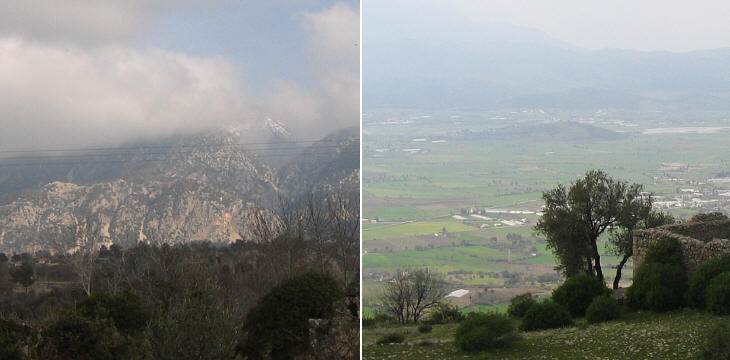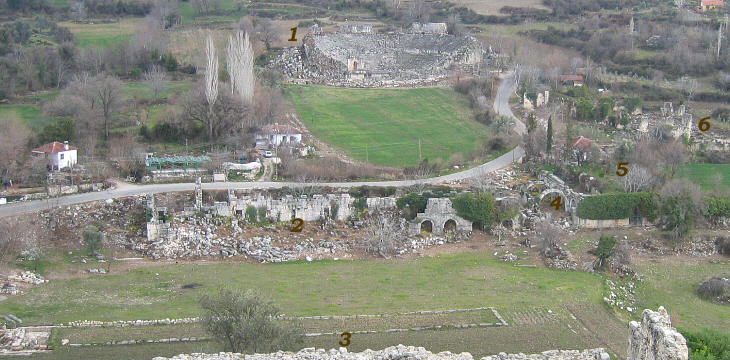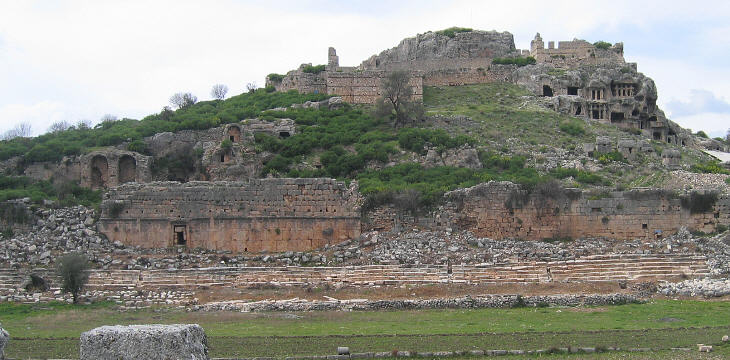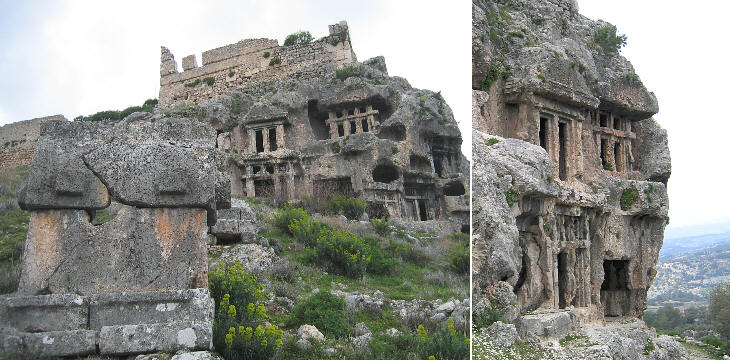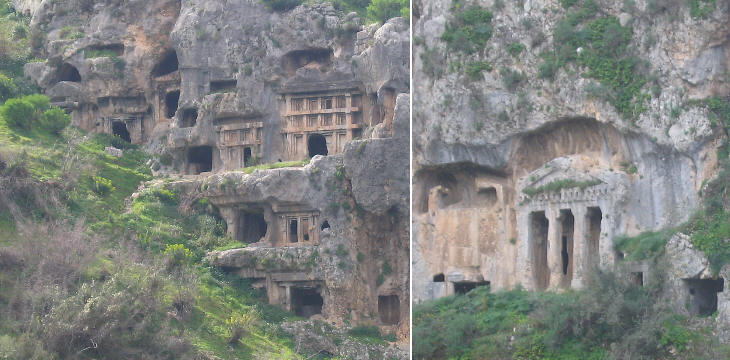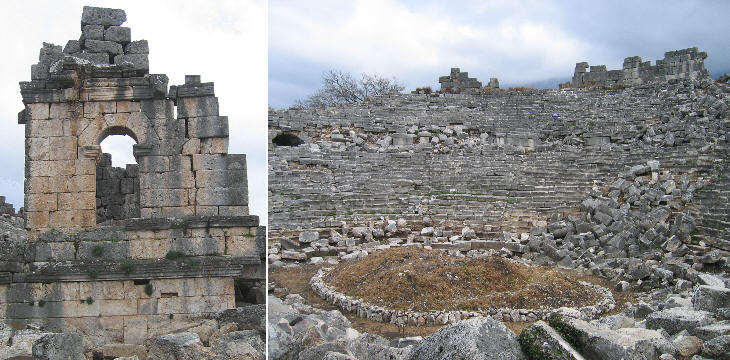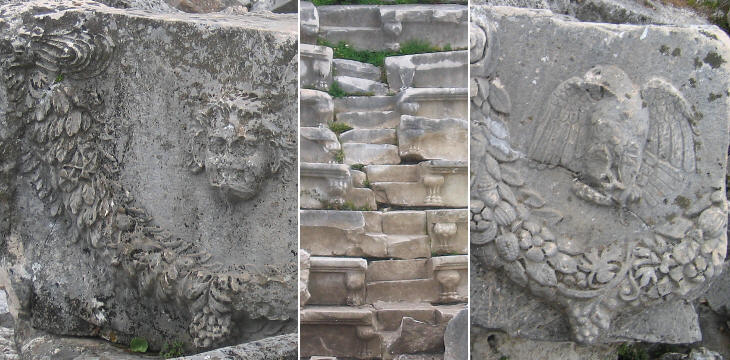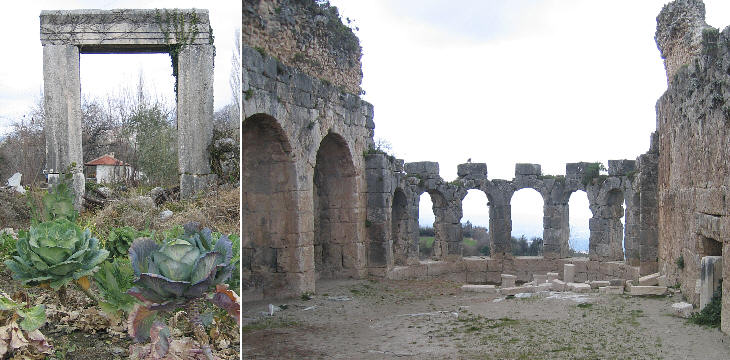  What's New! Detailed Sitemap All images © by Roberto Piperno, owner of the domain. Write to romapip@quipo.it. Text edited by Rosamie Moore. Page added in May 2008. |
 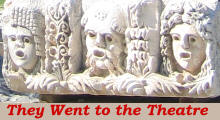 - Tlos - Tlos(Theatrical masks at Myra) In general the ancient towns of Lycia were built on the coast or in its proximity. Tlos was a major exception to this rule because it was located inland, on a hill controlling the upper valley of the Xanthus River (today it is known as the Esen River). The valley was crossed by a road which linked the port of Letoon and the important town of Xanthos to a pass in the high mountains which surround the Anatolian tableland.
Due to its strategic position Tlos continued to be inhabited until the early XIXth century: today it is only a small village known as Yaka and parts of the archaeological area are farmed.
Tlos was founded on the very top of the hill and it was fortified with walls. In 141 AD an earthquake struck the region causing immense damage in many Lycian towns. We know from inscriptions that Opramoas, a very wealthy man, made significant donations to these towns to help them in the reconstruction; at that time the strength of the Roman Empire was at its peak and Lycia was far from its borders, so the new town was built outside the walls, as no enemies threatened it.
The various phases of the history of Tlos are summarized in the image above. At the top there is the bare rock which attracted the first settlers because it was easy to defend. To the right a series of rock-cut tombs and free-standing sarcophagi are the most impressive cultural feature of Ancient Lycia. Around the rock there are walls built by the Byzantines which were later on modified by the Ottomans. The lower part of the image shows a section of a very long ancient wall with a gate and in the foreground the Roman stadium which had seats for 3,500.
With the spread of Hellenism in Lycia rock-cut tombs were shaped in the form of small classical temples (see examples at Telmessos). In Tlos the majority of the tombs retained the traditional Lycian design.
The whole northern side of the hill is covered with rock-cut tombs, one of which is decorated with a relief portraying the mythical hero Bellerophon. He was asked by the Lycian king Iobates to do him the service of destroying Chimaera, a fire-breathing monster. Before setting about his task, Bellerophon caught and tamed the winged horse Pegasus. He then overcame Chimaera by flying above her on Pegasus' back, riddling her with arrows, and then thrusting between her jaws a lump of lead which he had fixed to the point of his spear. Chimaera's fiery breath melted the lead, which trickled down her throat, searing her vital organs.
A large theatre was built with the donations of many citizens: its construction took advantage of a slope only to a very limited extent: most of its 34 rows of seats were supported by a complex structure of underground vaults. Part of the stage building still stands.
The theatre had a rich decoration mainly based on festoons showing fruits and crops farmed in the valley. The image used as background for this page is also based on a relief of the theatre.
Tlos during the Roman period had two public baths: the larger ones had a hall with seven windows overlooking the valley. Introductory page Miletus Priene Didyma Euromos Iasos Milas Telmessos Kaunos Xanthos Letoon Patara Antiphellos Simena Myra Phaselis Termessos Attalia (Antalya) Perge Aspendos Side Map of Turkey with all the locations covered in this website  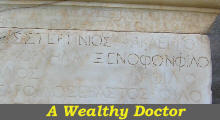 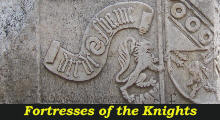 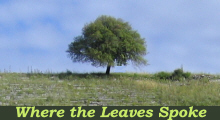 |
